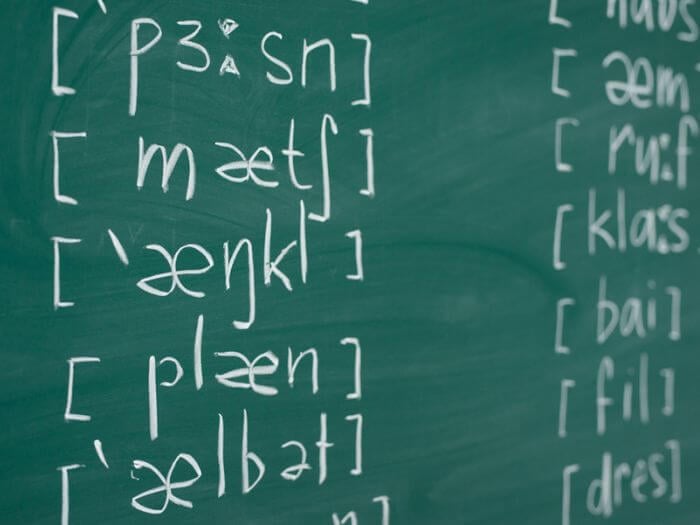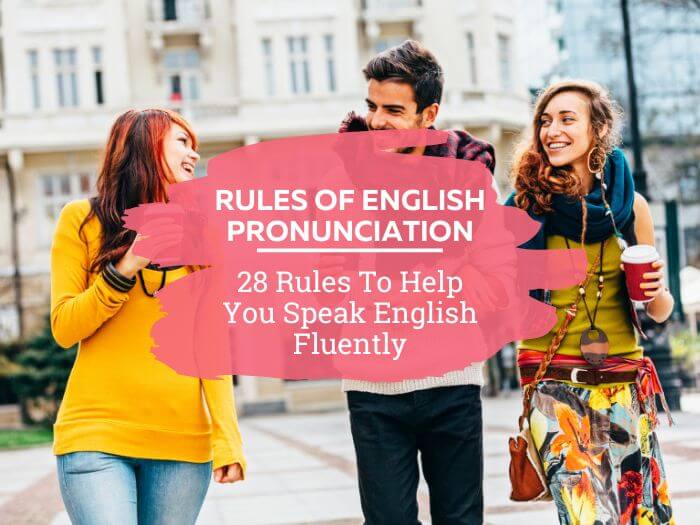English grammar has rules. English vocabulary has rules. StoryLearning has rules!
And if you’re here today, it may be because you want to find out more about the rules of English pronunciation too.
I have 28 for you.
But before we look at them, let me ask you some questions:
- What are vowel and consonant sounds?
- How many are there?
- What’s a vowel letter? What’s a consonant letter?
- What do we mean by “word stress” in English?
- Do you know what IPA is?
If you can answer all these questions, feel free to skip the sections below.
But if you can’t, then read on.
Table of Contents
English Consonants And Consonant Sounds

There are 21 consonant letters in the English alphabet (B, C, D, F, G, H, J, K, L, M, N, P, Q, R, S, T, V, W, X, Y, Z), and – in most English accents – there are 24 consonant sounds.
These are types of sounds that you make by partially or completely blocking the air as it comes out of your mouth. (It’s impossible to say the word “language” without stopping the air by curling your tongue when you pronounce the first letter).
But why are there more consonant sounds than letters? Well, as you may know, in English the spelling-pronunciation relationship is not a happy one so the same consonant letter can be pronounced using different consonant sounds.
C, for example, is pronounced differently in “cat” (/kæt/) and “cinema” (/ˈsɪn.ə.mə/). You’ll see more examples of this later when we look at the rules.
“Olly, wait a second. What’s that strange thing you wrote after ‘cat’ and ‘cinema’”?
Good question. That’s the IPA.
IPA
IPA stands for International Phonetic Alphabet and is like a special set of symbols that helps us understand how to pronounce words.
In English, and many other languages, the way words are written doesn't always show exactly how they are spoken. So IPA gives us a way to represent the sounds accurately.
These are all the sounds in English represented in the IPA.

The consonant sounds are /p/, /b/, /m/, /t/, /d/, /n/, /s/, /z/, /l/, /ʃ/,/ʒ/, /j/, /tʃ/, /k/, /g/, /ŋ/, and /h/.
They’re different from vowel sounds.
English Vowels And Vowel Sounds

Vowel sounds are the ones you make when you open your mouth and let the air flow freely.
There are 5 vowel letters in the English language (A, E, I, O, U), but there are 20 (sorry!) vowel sounds in total.
These are divided into 5 long vowels, 7 short vowels, and 8 diphthongs (a fancy word that means ‘a combination of two vowel sounds’).
- 5 long vowels: /iː/ /uː/ /ɑː/ /ɔː/ /ɜː/
- 7 short vowels: /ɪ/ /ʊ/ /ə/ /e/ /ɒ/ /ʌ/ /æ/
- 8 diphthongs: /eɪ/ /aɪ//ɔɪ/ /əʊ/ /aʊ/ /ɪə/ /eə/ /ʊə/
So, going back to “cat” and “cinema”, here are the phonemic transcriptions of the words using IPA.
- cat – /kæt/
- cinema – /ˈsɪnəmə/
See that little apostrophe (‘) before the /s/ sound? That represents the word stress.
Word Stress In English

When we say a word, we emphasize or stress certain syllables more than others. This means we say them louder, longer, and with a slightly higher pitch.
For example, in the word “cinema,” a three-syllable word, the stress in on the first syllable: CI-ne-ma
Some other examples:
- HO-tel /hoʊˈtɛl/
- KI-tchen /ˈkɪtʃən/
- com-PU-ter /kəmˈpjuːtər/
- EL-e-phant /ˈɛlɪfənt/
- un-be-LIEV-a-ble /ʌn·bɪˈliːvəbəl/
Notice where the apostrophe (‘) is: it always comes before the stressed syllable.
Okay, everything clear? I hope so!
Now you’re ready to learn the 28 rules of English pronunciation.
1. Double Consonants
In some languages like Italian and Japanese, double consonant letters are held or pronounced with a longer duration than single consonants.
This doesn’t happen in English because double consonants are pronounced as single consonants.
Here are some example words:
- Apple: /ˈæpəl/ (not /ˈæppəl/)
- Butter: /ˈbʌtər/
- Address: /əˈdrɛs/
- Summer: /ˈsʌmər/
- Kitten: /ˈkɪtən/

Pronouncing Long And Short Vowel Sounds

A vowel is long when it sounds like saying the letter of the vowel from the alphabet. Here are some examples to make this clear.
“Cake”: In the word “cake,” the “a” is a long vowel sound (/eɪ/) because you pronounce it like the letter A when saying the alphabet.
“Globe”: The “o” is a long vowel sound (/oʊ/) because you pronounce it like the letter O when saying the alphabet. The same goes for “e” (/i:/) in “team”, “u” (/uː/) in “cube” and “i” in “island”.
As you can see, the vowel is pronounced like the name of the vowel letter itself.
In short vowel sounds, however, this doesn’t happen. The vowel pronunciation is the sound of the letter, rather than the name of the vowel in the alphabet.
Here are some example words that contain a short vowel sound:
“Cat”: the “a” is a short vowel sound (/æ/) because it's pronounced quickly and doesn't sound like the letter A when saying the alphabet. You say, “cat” (/kæt/), not “Kate” (/keɪt/).
“Sit”: the “i” is a short vowel sound (/ɪ/) for the same reason. Sit (/sɪt/), not site (/sait/).
The same goes for “o” in “dog”, “e” in “pen” and “u” in “bus”.
But how can you know when you need a long or short vowel sound? Here are some useful guidelines for you:
2. Vowels At The End Of A Syllable Produce Long Vowel Sounds
Examples:
- me /miː/
- hero /ˈhɪəroʊ/
- time /taɪm/
- cute /kjuːt/
- flute /fluːt/

3. Vowel Combinations Create Long Vowels
Examples: “ai” in “paid”, “ee” in “fee”, “ie” in pie, “oa” in boat.
- Paid /peɪd/
- Fee /fiː/
- Boat /boʊt/
4. A Silent “e” At The End Of One-Syllable Words Makes The Preceding Vowel Sound Longer
Examples:
- Mat /mæt/ becomes mate /meɪt/
- Hop /hɒp/ becomes hope /hoʊp/
- Bit /bɪt/ becomes bite /baɪt/
- Cap /kæp/ becomes cape /keɪp/
- Rid /rɪd/ becomes ride /raɪd/
5. The Letters “i” And “o” Are Pronounced As Long Vowel Sounds Between Two Consonants
Examples:
- Find /faɪnd/
- Gold /ɡoʊld/
- Mind /maɪnd/
- Hold /hoʊld/
- Bold /boʊld/
- Cold /koʊld/
- Kind /kaɪnd/
- Old /oʊld/
- Blind /blaɪnd

6. If A Vowel Is Followed By A Single Consonant At The End Of A Word, It's A Short Vowel
Examples:
- Mat /mæt/
- Hop /hɒp/
- Bit /bɪt/
- Cap /kæp/
- Red /rɛd/
- Can /kæn/
- Sit /sɪt/
- Beg /bɛɡ/
- Run /rʌn/
- Wet /wɛt/
7. In Words With Two Of The Same Consonant Letters In The Middle, The Vowel Before Them Usually Sounds Short
On the other hand, if you have a word with just one consonant letter in the middle (like “t” in “mate” or “n” in “bone”), the vowel right before that consonant will usually sound long.
Examples:
- Hater /ˈheɪ.tər/ – Hatter /ˈhæt.ər/
- Later /ˈleɪ.tər/ – Latter /ˈlæt.ər/
- Biter /ˈbaɪ.tər/ – Bitter /ˈbɪt.ər/
- Filer /ˈfaɪ.lər/ – Filler /ˈfɪl.ər/
8. Doubled Vowels Are Usually Pronounced With A Long Vowel Sound

- Feet /fiːt/
- Moon /muːn/
- Cheese /tʃiːz/
- Keep /kiːp/
- Teen /tiːn/
Some exceptions: book, foot, blood, deer.
9. If Two Different Vowels Are Next To Each Other, The Second Is Usually Silent While The First Is Long
- Team /tiːm/
- Coat /koʊt/
- Train /treɪn/
- Blue /bluː/
- Pain /peɪn/
Let’s now have a look at the rules of English pronunciation for silent letters.
10. Silent A
A is silent in adverbs that end in “-ically”.
- Basically /ˈbeɪsɪkli/
- Dramatically /drəˈmætɪkli/
- Comically /ˈkɒmɪkli/
- Automatically /ˌɔːtəˈmætɪkli/
- Technically /ˈtɛknɪkli/
- Ironically /aɪˈrɒnɪkli/
- Systemically /sɪsˈtɛmɪkli/
- Historically /hɪsˈtɒrɪkli/
- Politically /pəˈlɪtɪkli/
- Economically /ˌiːkəˈnɒmɪkli/
11. Silent B

B is silent before “t” and after “m”:
- Lamb /læm/
- Debt /dɛt/
- Tomb /tuːm/
- Limb /lɪm/
- Bomb /bɑm/
- Womb /wuːm/
- Climb /klaɪm/
- Dumb /dʌm/
12. Silent C
C is silent after ‘s':
- Science /ˈsaɪəns/
- Scene /siːn/
- Muscle /ˈmʌsəl/
- Scent: /sɛnt/
- Scissors /ˈsɪzərz/
- Scenic /ˈsiːnɪk/

13. Silent E
E is silent at the end of many words:
- Cake /keɪk/
- Plate /pleɪt/
- Smile /smaɪl/
- Ride /raɪd/
- Hike /haɪk/
- Love /lʌv/
- Give /ɡɪv/
- Home /hoʊm/
- Time /taɪm/
- Note /noʊt/
- Name /neɪm/
14. Silent GH
GH is silent at the middle or end of several words:
- High /haɪ/
- Though /ðoʊ/
- Night /naɪt/
- Thought /θɔt/
- Light /laɪt/
- Sigh /saɪ/
- Neighbour /ˈneɪ.bər/
- Enough /ɪˈnʌf/
- Laugh /læf/
- Daughter /ˈdɔtər/
15. Silent K

K is silent when it comes at the beginning of a word and it’s followed by ‘n':
- Knee /niː/
- Knife /naɪf/
- Know /noʊ/
- Kneel /niːl/
- Knock /nɑk/
- Knickers /ˈnɪkərz/
- Knapsack /ˈnæpsæk/
- Knot /nɑt/
- Knew /njuː/
- Knight /naɪt/
- Knee-cap /ˈniːˌkæp/
16. Silent N
N is silent when it comes after ‘m':
- Mnemonic /nɪˈmɒnɪk/
- Mnemosyne /nɪˈmɒsɪni/
- Mnemotechnics /nɪˌmoʊtɛkˈnɪks/
17. Silent P
P is silent when it comes at the beginning of a word and it’s followed by ‘s':
- Psychology /saɪˈkɒlədʒi/
- Pseudonym /ˈsuːdənɪm/
- Pterodactyl /ˌtɛrəˈdæk.tɪl/
- Psychiatry /saɪˈkaɪətri/
- Pseudo /ˈsuːdoʊ/
18. Silent W
W is silent when it comes at the beginning of a word and it’s followed by ‘r':
- Write /raɪt/
- Wrong /rɔŋ/
- Wrap /ræp/
- Wrist /rɪst/
- Wrestle /ˈrɛsl/
- Wreck /rɛk/
- Wring /rɪŋ/
- Wrench /rɛntʃ/

19. Silent G
G is silent when paired with ‘n’ at the end of a word:
- Resign /rɪˈzaɪn/
- Feign /feɪn/
- Reign /reɪn/
- Align /əˈlaɪn/
- Assign /əˈsaɪn/
- Campaign /kæmˈpeɪn/
- Foreign /ˈfɔrɪn/
- Design /dɪˈzaɪn/
- Benign /bɪˈnaɪn/
- Malign /məˈlaɪn/
But GN is pronounced in the middle of a word:
- Signal /ˈsɪgnəl/
- Ignorant /ˈɪɡ.nərənt/
- Pregnant /ˈprɛɡ.nənt/
- Dignity /ˈdɪɡnəti/
- Indignation /ˌɪndɪɡˈneɪʃən/
20. Silent L
The letter L is silent in the following:
- Should /ʃʊd/
- Could /kʊd/
- Would /wʊd/
- Half /hæf/
- Calf /kæf/
- Chalk /tʃɔːk/
- Talk /tɔːk/
- Walk /wɔːk/
- Folk /foʊk/
- Yolk /joʊk/

Let’s now look at the rules of English pronunciation for “-ed” endings. A tricky topic!
21. “-ed” Endings

Decided, interested, asked, surprised, jumped, played – all these words end in “-ed”. They all look similar on paper but the pronunciation of the “ed” varies.
Here are three basic rules for pronouncing “-ed” endings:
/t/ sound: When the base verb ends in a voiceless consonant sound (sounds produced without using your vocal cords such as /p/, /t/, /k/, /f/, /θ/, /s/, /ʃ/, and /ʧ/) “-ed” is pronounced as a /t/ sound.
Some examples:
- Worked /wɜːrkt/
- Helped /hɛlpt/
- Stopped /stɒpt/
- Baked /beɪkt/
- Laughed /læft/
- Watched /wɑːtʃt/
/d/ sound: When the base verb ends in a voiced consonant sound (a sound produced by the vibration of your vocal cords) or a vowel sound, except for the /t/ or /d/ sounds, the “-ed” ending is pronounced as a /d/ sound.
Examples:
- Played /pleɪd/
- Closed /kloʊzd/
- Named /neɪmd/
- Tried /traɪd/
- Used /juːzd/
- Loved /lʌvd/
/ɪd/ sound: When the base verb ends in a /t/ or /d/ sound, the “-ed” ending is pronounced as an additional syllable with an /ɪd/ sound.
Examples:
- Hunted /ˈhʌntɪd/
- Needed /ˈniːdɪd/
- Wanted /ˈwɒntɪd/
- Needed /ˈniːdɪd/
- Hated /ˈheɪtɪd/
- Decided /dɪˈsaɪdɪd/
22. Assimilation
When a word ends in a /t/, /s/, or /ts/ sound and is followed by a word beginning with a /y/ sound, the two sounds become one
For example:
- /t/ + /y/ = /tʃ/ I’ll meet you there! /aɪl mitʃuː ðɛr/
- /ts/ + /y/ = /tʃ/ She’ll eats you alive! /ʃiːl iːtʃuː əˈlaɪv/
- /s/ + /y/ = /ʃ/ You must face your worries. /juː mʌst feɪʃər ˈwʌriz/
23. /t/ Becomes /p/

/t/ – when followed by /p/, /b/ or /m/ – becomes /p/
Examples:
- That person. /ðæp ˈpɜːsən/
- It boils. /ɪp ˈbɔɪlz/
- That man. / ðæp ˈmæn/
Check out Cara Leopold’s blog for more examples
24. Intrusive /j/, /w/, And /r/
Intrusion happens in natural speech when you add an extra sound between two words to connect them. The extra sounds are often /j/, /w/, or /r/.
Some examples:
- He asked /hiː jˈæskt/
- Do it /duwɪt/
- Law and order” /lɔːr ənd ˈɔrdər/
25. Elision
Elision is the opposite of intrusion. You don’t add sounds. Instead, you remove them to make your speech sound more fluent. Elision often happens when you have to connect a word ending in a /t/ sound to another word.
For example:
- Next day /nɛks deɪ/
- I must go /aɪ mʌs ɡoʊ/
26. Pronunciation Of “ch”

CH can be /tʃ/ or /k/.
For example:
- /tʃ/: chair, much, cheese, church, match
- /k/: chemistry, chorus, echo, character, school
27. Stress Turns Nouns Into Verbs
Word stress can affect the meaning of the word. Specifically, it can change a word from being a noun to a verb.
When the stress is on the first syllable of a word, that word usually acts as a noun. For example, when we say “RE-cord,” with stress on the first syllable, we mean a physical or digital recording of something, like a song or a video.
On the other hand, when the stress is on the last syllable of a word, that word typically functions as a verb.
So, when we say “re-CORD,” with stress on the last syllable, we mean the action of making a recording, like when you record a song or video.
Here are some other examples:
- Noun: She placed the OB-ject on the table. (emphasis on the first syllable)
- Verb: She will ob-JECT to the proposal. (emphasis on the second syllable)
- Noun: I received a PRE-sent for my birthday.
- Verb: I will pre-SENT my findings tomorrow.
- Noun: Do you have a PER-mit to park here?
- Verb: I will per-MIT you to enter.
- Noun: The farm's PRO-duce is fresh.
- Verb: They pro-DUCE delicious fruits.
28. Soft ‘g' And Hard ‘g'

The letter ‘g' can be pronounced softly (/ʤ/) or hard (/g/).
- Soft ‘g' (/ʤ/):
- Judge /ʤʌdʒ/
- Gentle /ˈʤɛntəl/
- Budget /ˈbʌdʒɪt/
- Gentleman /ˈʤɛntəlmən/
- Ginger /ˈʤɪndʒər/
- Agent /ˈeɪʤənt/
- Genuine /ˈʤɛnjuɪn/
- Forage /ˈfɔrɪdʒ/
- Judgment /ˈʤʌdʒmənt/
- Fudge /fʌdʒ/
- Fragile /ˈfrædʒəl/
- Allege /əˈlɛdʒ/
Hard ‘g' (/g/):
- Game /ɡeɪm/
- Get /ɡɛt/
- Glad /ɡlæd/
- Globe /ɡloʊb/
- Goose /ɡus/
- Great /ɡreɪt/
- Ground /ɡraʊnd/
- Guitar /ɡɪˈtɑr/
- Grain /ɡreɪn/
- Guidance /ˈɡaɪdəns/
Now that you know all these rules of English pronunciation, it’s time to put the theory into practice.
Some Tips On How To Improve Your English Pronunciation

Here are some things you can do:
- Listen actively to both native and non-native speakers and mimic their pronunciation. This will help you acquire the sound of the language.
- Visit Cara Leopold’s blog and join her amazing movie club. This will help you practise both speaking and listening.
- Transcribe words and sentences using IPA and check what you wrote with the IPA transcription you find in the dictionary. This will help you notice how words sound.
- Break words into syllables and practice pronouncing each syllable separately before putting them together.
- Work only on the sounds you find hard to produce.
- Use pronunciation apps and websites.
- Stand in front of a mirror and watch your mouth movements as you pronounce words and sounds. This can help you with articulation (the movements of the sounds).
- Record yourself saying lines from movies and compare your pronunciation with the original one.
- Ask for feedback from native and non-native speakers, teachers, and friends or language exchange partners.
- Surround yourself with English as much as possible.
Master The Rules Of English Pronunciation With Stories
And finally, read and listen to stories! You can start today by listening to the StoryLearning podcast.
Or you might want to use English audiobooks. You can stop the audiobook and read aloud a few sentences imitating the sounds.
My short stories in English books are also available in audiobook format, as well as my other books for English learners such as the 101 Conversations series.
Whatever you decide to do, have fun learning and practising your pronunciation in English!

Olly Richards
Creator of the StoryLearning® Method
Olly Richards is a renowned polyglot and language learning expert with over 15 years of experience teaching millions through his innovative StoryLearning® method. He is the creator of StoryLearning, one of the world's largest language learning blogs with 500,000+ monthly readers.
Olly has authored 30+ language learning books and courses, including the bestselling "Short Stories" series published by Teach Yourself.
When not developing new teaching methods, Richards practices what he preaches—he speaks 8 languages fluently and continues learning new ones through his own methodology.










































